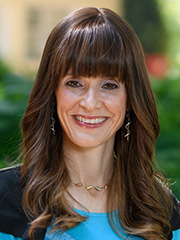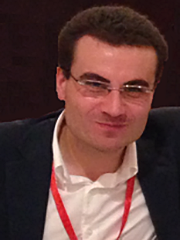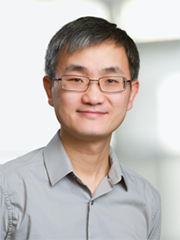| Deep Analog-to-Digital Compression with Applications to Automotive Radar and Massive MIMO | Prof. Yonina Eldar | Weizmann Institute of Science, Israel |
|---|---|---|
| Reconfigurable Intelligent Surfaces: From Electromagnetics to Communications | Prof. Marco Di Renzo | CentraleSupelec, Paris-Saclay University, France |
| A Learning Approach to the Design of Massive MIMO and Intelligent Reflecting Surface Systems | Prof. Wei Yu | University of Toronto, Canada |
Full-duplex Wireless Transmission: Practical Realization and New Theoretical Results (CANCELLED) |
Prof. Amir Khandani | University of Waterloo, Canada |

The famous Shannon-Nyquist theorem has become a landmark in analog to digital conversion and the development of digital signal processing algorithms. However, in many modern applications, the signal bandwidths have increased tremendously, while the acquisition capabilities have not scaled sufficiently fast. Furthermore, the resulting high rate digital data requires storage, communication and processing at very high rates which is computationally expensive and requires large amounts of power. In this talk we consider a general framework for sub-Nyquist sampling and processing in space, time and frequency which allows to dramatically reduce the number of antennas, sampling rates, number of bits and band occupancy in a variety of applications. It also allows for the development of efficient joint radar-communication systems. Our framework relies on exploiting signal structure, quantization and the processing task in both standard processing and in deep learning networks. We consider applications of these ideas to a variety of problems in wireless communications, efficient massive MIMO systems, automotive radar and ultrasound imaging and show several demos of real-time sub-Nyquist prototypes including a wireless ultrasound probe, sub-Nyquist automotive radar, cognitive radio and radar, dual radar-communication systems, analog precoding, sparse antenna arrays, and a deep Viterbi decoder.
Yonina Eldar is a Professor in the Department of Mathematics and Computer Science, Weizmann Institute of Science, Rehovot, Israel. She was previously a Professor in the Department of Electrical Engineering at the Technion, where she held the Edwards Chair in Engineering. She is also a Visiting Professor at MIT, a Visiting Scientist at the Broad Institute, and an Adjunct Professor at Duke University and was a Visiting Professor at Stanford. She received the B.Sc. degree in physics and the B.Sc. degree in electrical engineering both from Tel-Aviv University (TAU), Tel-Aviv, Israel, in 1995 and 1996, respectively, and the Ph.D. degree in electrical engineering and computer science from the Massachusetts Institute of Technology (MIT), Cambridge, in 2002. She is a member of the Israel Academy of Sciences and Humanities, an IEEE Fellow and a EURASIP Fellow. She has received many awards for excellence in research and teaching, including the IEEE Signal Processing Society Technical Achievement Award (2013), the IEEE/AESS Fred Nathanson Memorial Radar Award (2014) and the IEEE Kiyo Tomiyasu Award (2016). She was a Horev Fellow of the Leaders in Science and Technology program at the Technion and an Alon Fellow. She received the Michael Bruno Memorial Award from the Rothschild Foundation, the Weizmann Prize for Exact Sciences, the Wolf Foundation Krill Prize for Excellence in Scientific Research, the Henry Taub Prize for Excellence in Research (twice), the Hershel Rich Innovation Award (three times), the Award for Women with Distinguished Contributions, the Andre and Bella Meyer Lectureship, the Career Development Chair at the Technion, the Muriel & David Jacknow Award for Excellence in Teaching, and the Technion’s Award for Excellence in Teaching (two times). She received several best paper awards and best demo awards together with her research students and colleagues, was selected as one of the 50 most influential women in Israel, and was a member of the Israel Committee for Higher Education. She is the Editor in Chief of Foundations and Trends in Signal Processing and a member of several IEEE Technical Committees and Award Committees.

A reconfigurable intelligent surface (RIS) is an emerging technology that enables the control of the electromagnetic waves. An RIS is a thin sheet of electromagnetic material, which is made of many nearly passive scattering elements that are controlled through low cost and low power electronic circuits. By appropriately configuring the electronic circuits, different wave transformations can be realized. Recent research works have shown that RISs whose geometric size is sufficiently large can outperform other technologies, e.g., relays, at a reduced hardware and signal processing complexity, and can enhance the reliability of wireless links by reducing the fading severity. In addition, the achievable performance of RIS-assisted systems has been proved to be robust to various hardware impairments, e.g., the phase noise, which may further reduce the implementation cost. To quantify the performance gains offered by RISs in wireless networks, realistic communication models need to be employed. In this talk, we offer a critical appraisal of the communication models currently employed for analyzing the ultimate performance limits and for optimizing RIS-assisted wireless networks. Furthermore, we introduce a new tractable, electromagnetic-compliant, and circuit-based communication model for RIS-assisted transmission and discuss its applications to the modeling and optimization of wireless systems. Source: arXiv:2009.02694 and arXiv:2011.14373.
Marco Di Renzo received the Laurea (cum laude) and Ph.D. degrees in electrical engineering from the University of L'Aquila, Italy, in 2003 and 2007, respectively, and the Habilitation à Diriger des Recherches (Doctor of Science) degree from University Paris-Sud, France, in 2013. Since 2010, he has been with the French National Center for Scientific Research (CNRS), where he is a CNRS Research Director (CNRS Professor) in the Laboratory of Signals and Systems (L2S) of Paris-Saclay University – CNRS and CentraleSupelec, Paris, France. In Paris-Saclay University, he serves as the Coordinator of the Communications and Networks Research Area of the Laboratory of Excellence DigiCosme, and as a member of the Admission and Evaluation Committee of the Ph.D. School on Information and Communication Technologies. Currently, he serves as the Editor-in-Chief of IEEE Communications Letters, and is a Distinguished Speaker of the IEEE Vehicular Technology Society. In 2017-2020, he was a Distinguished Lecturer of the IEEE Vehicular Technology Society and IEEE Communications Society. Also, he served as an Editor and the Associate Editor-in-Chief of IEEE Communications Letters, and as an Editor of IEEE Transactions on Communications and IEEE Transactions on Wireless Communications. Currently, he serves as the Founding Chair of the Special Interest Group on Reconfigurable Intelligent Surfaces of the Wireless Technical Committee of the IEEE Communications Society, and is the Founding Lead Editor of the IEEE Communications Society Best Readings in Reconfigurable Intelligent Surfaces. He is a Highly Cited Researcher (Clarivate Analytics, 2019), a World’s Top 2% Scientist from Stanford University (2020), a Fellow of the IEEE (2020), and a Fellow of the IET (2020). He has received several individual distinctions and research awards, which include the IEEE Communications Society Best Young Researcher Award for Europe, Middle East and Africa, the Royal Academy of Engineering Distinguished Visiting Fellowship, the IEEE Jack Neubauer Memorial Best System Paper Award, the IEEE Communications Society Young Professional in Academia Award, the SEE-IEEE Alain Glavieux Award, and a 2019 IEEE ICC Best Paper Award. In 2019, he was a recipient of a Nokia Foundation Visiting Professorship for conducting research on metamaterial-assisted wireless communications at Aalto University, Finland.

In this talk, we explore the use of deep learning techniques for optimizing channel sensing and downlink precoding for the massive MIMO systems and for systems equipped with intelligent reflecting surfaces. Instead of the traditional paradigm of first performing channel estimation, then designing the communication system according to the estimated channel, we advocate an approach of directly mapping the received pilots to the precoders through machine learning. For the frequency-division duplex massive MIMO system, we show that deep learning can be used for the efficient and distributed channel sensing, quantization, feedback and downlink multiuser precoding task with rate-limited feedback, in effect solving a distributed source coding problem. For the intelligent reflecting surface system, we show that a graph neural network can learn to find the optimal reflective coefficients and the optimal beamformers without explicit channel estimation. We show that the proposed deep learning approach can significantly reduce the required pilot length. We further make progress toward finding generalizable architectures and toward the interpretability of the resulting solutions.
Wei Yu received the B.A.Sc. degree in Computer Engineering and Mathematics from the University of Waterloo Canada in 1997 and M.S. and Ph.D. degrees in Electrical Engineering from Stanford University, U.S.A., in 1998 and 2002, respectively. Since 2002, he has been with the Electrical and Computer Engineering Department at the University of Toronto, Canada, where he is now Professor and holds a Canada Research Chair (Tier 1) in Information Theory and Wireless Communications. Prof. Wei Yu is a Fellow of IEEE, a Fellow of the Canadian Academy of Engineering, and a member of the College of New Scholars, Artists and Scientists of the Royal Society of Canada. He received the IEEE Marconi Prize Paper Award in Wireless Communications in 2019, the IEEE Communications Society Award for Advances in Communication in 2019, the IEEE Signal Processing Society Best Paper Award in 2017 and 2008, the Journal of Communications and Networks Best Paper Award in 2017, and the IEEE Communications Society Best Tutorial Paper Award in 2015. He is the President of the IEEE Information Theory Society in 2021.